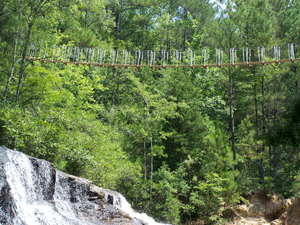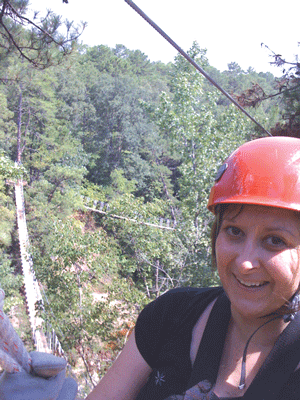 For the past 50 years or so Carver Falls has remained a personal treasure of the Bryan
family. Occasionally the family would open the property up to the Boy Scouts for projects and
the like, but otherwise it went pretty much unnoticed and unused by the
citizens of Fayetteville. That has all changed.
For the past 50 years or so Carver Falls has remained a personal treasure of the Bryan
family. Occasionally the family would open the property up to the Boy Scouts for projects and
the like, but otherwise it went pretty much unnoticed and unused by the
citizens of Fayetteville. That has all changed.
On July 25, Zipquest Waterfall & Treetop Adventure opened, which
has allowed the Bryans to make the most of the beautiful landscape and
natural resources that have been tucked away, right off Ramsey Street
for decades.
“We have really tried to make this course as eco-friendly, and exciting
as possible,” said Phil Kroll, director of operations for S.T.E.P.S.,
Inc., the company that custom designed and built the course. “We
wanted it to be challenging but still offer a chance to make the most of
the great views and natural resources that you have here.”
The new entertainment venue is located on 55 acres of pristine
forest in the heart of Cumberland County. Carver’s Falls is named for
Samuel Carver who received it along with 640 acres from King George
II of England in 1735.
There is little known about the use of Carver’s Falls, however a Mill House that was used
to mill grain was erected on the property. The mill was powered by the waters fl owing through a
canal diverted from Carver’s Creek. The Old Mill House still stands today and can be seen from
several zipline runs.
Carver’s Falls is located on the west side of the Cape Fear river in North Fayetteville. It occurs
at the intersection of Carver’s Creek and McPherson Creek creating a waterfall that is over
150 feet wide and two stories tall. The stone-like formation is known
as the “Cape Fear Formation”. The two combined creeks are known as
Carvers Creek which empties into the Cape Fear River.
Great care was taken in preserving the natural fl ora and fauna that
abound along the course. The Bryans’ goal was to create an exciting
venue while preserving the beauty and timelessness of the natural
habitat.
Zipquest is a thrill a minute. A fast paced and intense zip-line tour,
the course includes 16 tree platforms, eight zip lines, three sky bridges,
three spiral staircases and two highly trained canopy guides. It is
designed so that once adventurers are geared up and hooked to the line,
their feet don’t touch the ground until the tour is over — which can be
up to three hours give or take.
It costs $79 per person and zippers must be 10-years-old and
weigh 70 lbs. to try the course. Zipquest offers group excursions and
discounts are offered for active duty military and there are also group discounts available. The
park is open seven days a week with the fi rst tour starting at 8 a.m. Book online at www.zipquest.
com or give them a call at 488-8787.
Photo top left:
A birds eye view of Carver Falls.
A Thrill Every Heart-Pounding, Breathtaking Minute
When I opened the press release for Zipquest, I was
slightly intrigued, and then I didn’t think about it anymore
— mostly because I am the biggest non-adventuring scaredy
cat ever, — and never expected to fi nd myself
anywhere near an adventure course.
The eight zip lines, each seemingly
higher and longer than the next, the three
bridges (one of which is the longest in the
state), the amazing treetop canopy, the
beautiful waterfall, the eco-friendly way the
course was constructed and the top-notch
safety procedures they follow on the course
didn’t cross my mind again until my boss emailed
me an invitation to join her at media
day. I (very) reluctantly agreed to go — but
not to participate.
When all of the information gathering,
interviewing and picture taking (from the
ground) was over, I thought I was going
to escape unscathed; however, Tiny, the
course manager, threw down the gauntlet:
“Stephanie, if you will trust me, I know
that I can get you through this course.”
I knew I could not do it in front of my peers in the
media, but I agreed to return the next day, when there would
be no peers there to see me fall apart, no one in line behind
me angry and appalled at the multi-phobic mess of a woman
hyperventilating, shaking and covered in tears keeping them
from enjoying their adventure.
The second I heard myself say “Okay, two o’clock
tomorrow then,” I started praying for whatever combination
of natural disaster and horrible illness it would take to get
me out of my commitment to try the zip line because I am
petrifi ed of heights, falling and being strapped to things.
My prayers went unanswered. The weather was beautiful
the next day and apparently, Tiny was feeling fi ne, judging
from the big smile on his face when I got there. (I think
he was surprised that I actually showed up, and honestly, so
was I.)
Since I had killed and maimed myself 10,000 times over
in my mind since agreeing to this lunacy, signing the release
form was a piece of cake. I signed, dated, crossed my heart
and handed it back to Tiny with shaking, sweaty hands.
Shea and Tiny (my two ever encouraging and patient
guides) escorted me to ground school — the 10 minute
course where you learn all the safety rules and intricacies of
how not to spin out of control and slam yourself into trees as
a method of stopping. Eventually, I was pronounced competent
and ready to zip.
The next two and a half hours are a blur. I came off the
fi rst zip line severely frazzled, but physically unharmed —
and was very disappointed to have to tell Tiny that no, in
fact, it was NOT awesome.
And so it went, from line to line. I forced myself into
position, each time thinking that surely, by the time I got to
the next tree, I would have conquered my fears, felt the rush
of exhilaration and joy that all the other riders I’d seen the
day before had so obviously felt.
Instead, I grabbed onto Tiny at every platform like
a drowning person latching on to a life preserver, and as
quickly as he could peel me off I would glom
onto the nearest tree, near tears, sweating and
panting like I had just run a marathon. I gave
a whole new meaning to the phrase “tree hugger”
that day.
I was so scared that I never actually
stepped off any of the platforms. I would get
into position, Shea would hold the cable and
I would close my eyes and say “Okay.” Then
she would let go. I would scream, tense up,
bump my helmet on the cable a few times
which resulted in a loud GZZZT and get right
into the braking position and start frantically
looking for Tiny to give me the signal that I
could stop.
I knew there were three bridges when we
started, so I don’t know why it was shocking to
see the first one emerge from the canopy.
I nearly sprung a leak as I reached (with
some insistent guidance from Tiny pulling me onto the
bridge and Shea nudging me from behind) toward the
cable railing. My feet became cement cinder blocks and my
fi ngers turned into sausages as I gripped that cable for dear
life and scooched my feet a centimeter at a time towards
the other end.
Tiny kept reminding me to keep my eyes on him, but
whenever I did that I only saw the platform we were trying
to get to which seemed to be getting further and further
away. Then my eyes would fi ll with tears, which made it
hard to see, which scared me even more so I would stop,
making the next step even harder.
When we got to the other side, Tiny congratulated me
and reminded me that we only had two more bridges to go.
I guess being at such a high altitude (they say it is
only 125 feet or so, but I don’t believe them) I had lost my
ability to count. I just knew for a fact that there was only
one more! I am telling you, I was devastated when I realized
there really were two more bridges to cross — and I’m
not talking about “no dessert after dinner” devastated, I’m
talking left at the altar or fi nding out you are one credit shy
of graduationdevastated.
I did finish the course with some of the fi nest coaxing,
cajoling and encouraging I have ever witnessed.
While I did not conquer my fears of height and speed
that day, with Shea and Tiny’s help I was able to accomplish
something I never thought I would even have the nerve to
try. I walked away from Zipquest a better person for the
experience, determined not to be defi ned by my insecurities
and inspired to push myself to try new things... and a little
jealous of all the folks out there who don’t have my phobias
who will be having remarkable adventures and making great
memories on this course — like my 11 year-old daughter
who experienced it with her dad and loved every minute!
— Stephanie Crider
Photo right: A thrill a minute, Zipquest was not only an adventure for me, but a confidence building course too.
The Other Side of the Bridge
While my coworker Stephanie was not so excited
about the Zipquest adventure, I was ready and willing to
jump in with both feet! Although I am not a huge fan of
heights or roller-coasters and the like, I am finding that,
as I get older, I am more and more willing, even eager,
to try something new. I’m starting a new adventure next
month as I get married and head off to Costa Rica for our
honeymoon. I saw Fayetteville’s new Zipquest as a chance
to try out zip lining before I am thousands of miles from
home soaring above a jungle accompanied by howler
monkeys. And, I admit, I also thought “This is relatively
fl at Fayetteville, how scary (or amazing and adventurous)
can it be?” And I was intrigued — I’ve lived here my
whole life, and went to Methodist College — and have
never heard of any waterfalls back in the woods!
 As I was strapped in to harnesses and shown the
ropes by the guides, I told them of my plans to visit Costa
Rica and zip line there. Many of the staff and bystanders
commented that they had been to Costa Rica, Belize and
the like and that Fayetteville’s zip line was better. I was a
little skeptical at those glowing reviews, but off I headed on
my adventure. As I went up to the fi rst platform, my heart
beat a little faster and the adrenaline started pumping. I
mentally went over the instructions on hand position and
stopping to make sure I would get it right. As I stepped
off the platform and whished along to the other side, I
thought “Wow, this IS fun!” Unlike my dear coworker,
I was never scared on the course. The guides took every
safety precaution, always making sure that they and each
zipliner were hooked in to the cables. As the tour progressed,
I was extremely impressed with the design of the
course. The timing of the tour was just about perfect. At a
little over two hours, I felt like I received a great experience
without feeling like “can this be over already.”
As I was strapped in to harnesses and shown the
ropes by the guides, I told them of my plans to visit Costa
Rica and zip line there. Many of the staff and bystanders
commented that they had been to Costa Rica, Belize and
the like and that Fayetteville’s zip line was better. I was a
little skeptical at those glowing reviews, but off I headed on
my adventure. As I went up to the fi rst platform, my heart
beat a little faster and the adrenaline started pumping. I
mentally went over the instructions on hand position and
stopping to make sure I would get it right. As I stepped
off the platform and whished along to the other side, I
thought “Wow, this IS fun!” Unlike my dear coworker,
I was never scared on the course. The guides took every
safety precaution, always making sure that they and each
zipliner were hooked in to the cables. As the tour progressed,
I was extremely impressed with the design of the
course. The timing of the tour was just about perfect. At a
little over two hours, I felt like I received a great experience
without feeling like “can this be over already.”
Our guides were friendly and knowledgeable about
the construction aspects of the course, as well as the
property itself.
I’m looking forward to the zip line in Costa Rica
now, if nothing else, just to compare the construction
and the safety features (I sure hope it is as good!). I can’t
wait to go back in the fall, when my son turns 10, and
experience Zipquest in autumn with him and my husband.
A year-round adventure, it will also be spectacular in the
spring when the wild dogwoods are in bloom. I think I
could return time and again to experience Fayetteville’s
seasons (yes, we have seasons!) from the treetops.
— Joy G. Kirkpatrick
 How to resolve AdBlock issue?
How to resolve AdBlock issue?  How to resolve AdBlock issue?
How to resolve AdBlock issue? 
 How to resolve AdBlock issue?
How to resolve AdBlock issue?  How to resolve AdBlock issue?
How to resolve AdBlock issue?  How to resolve AdBlock issue?
How to resolve AdBlock issue?  How to resolve AdBlock issue?
How to resolve AdBlock issue?  How to resolve AdBlock issue?
How to resolve AdBlock issue? 





